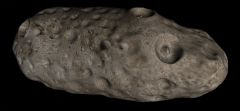Difference between revisions of "243 Ida"
(Edited category.) |
(Added content.) |
||
| Line 2: | Line 2: | ||
!bgcolor="lightsteelblue" colspan="2" align="center" |243 Ida | !bgcolor="lightsteelblue" colspan="2" align="center" |243 Ida | ||
|- | |- | ||
| − | |colspan="2" align="center"|[[Image: | + | |colspan="2" align="center"|[[Image:243Ida-Asteroid3Dzip-Orbiter2016D3D9.jpg|240px]] |
|- | |- | ||
| − | |colspan="2" align="center"|'''243 Ida from '' | + | |colspan="2" align="center"|'''243 Ida from ''Asteroid 3D.zip'' in Orbiter 2016 with D3D9''' |
|- | |- | ||
!bgcolor="lightsteelblue" colspan="2"|Designation | !bgcolor="lightsteelblue" colspan="2"|Designation | ||
| Line 30: | Line 30: | ||
!bgcolor="lightsteelblue" colspan="2"|Selected physical parameters | !bgcolor="lightsteelblue" colspan="2"|Selected physical parameters | ||
|- | |- | ||
| − | |width="30%"|Mean radius||align="right" width="30%"| | + | |width="30%"|Mean radius||align="right" width="30%"|10250 km |
|- | |- | ||
|width="30%"|Mass||align="right" width="30%"|1×10<sup>17</sup> kg | |width="30%"|Mass||align="right" width="30%"|1×10<sup>17</sup> kg | ||
| Line 44: | Line 44: | ||
|width="30%"|LAN||align="right" width="30%"|0 | |width="30%"|LAN||align="right" width="30%"|0 | ||
|- | |- | ||
| − | |width="30%"|Note||align="right" width="30%"|*Elements given are from 243 Ida.cfg ( | + | |width="30%"|Note||align="right" width="30%"|*Elements given are from 243 Ida.cfg (Asteroid 3D.zip) |
|} | |} | ||
| Line 58: | Line 58: | ||
|- | |- | ||
!Add-on!!Source!!Version!!Author!!Type!!Release Date!!Compatibility!!Wiki article | !Add-on!!Source!!Version!!Author!!Type!!Release Date!!Compatibility!!Wiki article | ||
| + | |- | ||
| + | |[https://www.orbiter-forum.com/resources/3d-asteroids.2291/ 3D Asteroids]||O-F Resources||2014-11-06||T1234||Scenery||6 November 2014|||| | ||
|- | |- | ||
|[https://www.orbiter-forum.com/resources/asteroid-pack-1-00.2832/ Asteroid Pack 1.00]||O-F Resources||2004-11-21||Nighthawke||Scenery||21 November 2004|||| | |[https://www.orbiter-forum.com/resources/asteroid-pack-1-00.2832/ Asteroid Pack 1.00]||O-F Resources||2004-11-21||Nighthawke||Scenery||21 November 2004|||| | ||
| Line 68: | Line 70: | ||
== Gallery == | == Gallery == | ||
| − | <gallery widths=" | + | <gallery widths="100" heights="100"> |
243Ida-MainBeltAsteroidszip.jpg|<center>243 Ida in Orbiter 2002P3 from ''MainBeltAsteroids051403.zip''</center> | 243Ida-MainBeltAsteroidszip.jpg|<center>243 Ida in Orbiter 2002P3 from ''MainBeltAsteroids051403.zip''</center> | ||
Dactyl243Ida-MainBeltAsteroidszip.jpg|<center>Dactyl (left) and 243 Ida in the distance from ''MainBeltAsteroids051403.zip'' in Orbiter 2002P3</center> | Dactyl243Ida-MainBeltAsteroidszip.jpg|<center>Dactyl (left) and 243 Ida in the distance from ''MainBeltAsteroids051403.zip'' in Orbiter 2002P3</center> | ||
Ida-AsteroidPackv1zip-Orbiter2003P2.jpg|<center>243 Ida from ''AsteroidPack_v1.00.zip'' in Orbiter 2003P2</center> | Ida-AsteroidPackv1zip-Orbiter2003P2.jpg|<center>243 Ida from ''AsteroidPack_v1.00.zip'' in Orbiter 2003P2</center> | ||
| − | 243 ida crop.jpg|<center>243 Ida imaged by [[w:Gallilio (spacecraft)|Gallileo]] on 28 August 1993</center> | + | 243Ida-Asteroid3Dzip-Orbiter2016D3D9.jpg|<center>243 Ida from ''Asteroid 3D.zip'' in Orbiter 2016 with D3D9</center> |
| − | Ida-approach.gif|<center>A sequence of images of Ida showing rotation during Gallileo approach | + | 243 ida crop.jpg|<center>243 Ida imaged by [[w:Gallilio (spacecraft)|Gallileo]] on 28 August 1993<br>from Wikimedia Commons</center> |
| + | Ida-approach.gif|<center>A sequence of images of Ida showing rotation during Gallileo approach<br>from Wikimedia Commons</center> | ||
Dactyl1.jpg|<center>243 Ida's moon Dactyl</center> | Dactyl1.jpg|<center>243 Ida's moon Dactyl</center> | ||
</gallery> | </gallery> | ||
Latest revision as of 12:50, 9 November 2024
| 243 Ida | |
|---|---|

| |
| 243 Ida from Asteroid 3D.zip in Orbiter 2016 with D3D9 | |
| Designation | |
| Name | 243 Ida |
| Reference body | Sun |
| Planetary mean orbits | |
| Epoch | 2006 |
| Semimajor axis (a) | 428095018097.267 m |
| Eccentricity (e) | 0.0461355886406573 |
| Inclination (i) | 1.137396509° (0.0198513139804016 radian) |
| Longitude of the ascending node (LAN, ☊) | 324.2022181° (5.65839614806934 radian) |
| Longitude of periapsis (ϖ) | 432.7112368° (7.55223579223376 radian) |
| Mean longitude (L) | 767.1967825° (13.3901098652706 radian) |
| Selected physical parameters | |
| Mean radius | 10250 km |
| Mass | 1×1017 kg |
| Rotation elements | |
| SidRotPeriod | 16682.4 seconds (4.634 hours) |
| SidRotOffset | 0 |
| Obliqutiy | 0 |
| LAN | 0 |
| Note | *Elements given are from 243 Ida.cfg (Asteroid 3D.zip) |
243 Ida is a large asteroid shaped very elongated, perhaps a contact binary. It was discovered by Johann Palisa on 29 September 1884 and was named for a nurse of Zeus. On 17 February 1994, Ida was discovered to boast a small moon as it was imaged during the flyby of the Gallileo spacecraft in 1993 as it flew by enroute to Jupiter.
243 Ida in Orbiter[edit]
243 Ida and Dactyl were first introduced with the release of MainBeltAsteroids051403.zip in May 2003.
Note that the landing surface as given in the config file is spherical, but the visual of these bodies are not, if you land, you will likely be above or below the visual surface.
| Add-on | Source | Version | Author | Type | Release Date | Compatibility | Wiki article |
|---|---|---|---|---|---|---|---|
| 3D Asteroids | O-F Resources | 2014-11-06 | T1234 | Scenery | 6 November 2014 | ||
| Asteroid Pack 1.00 | O-F Resources | 2004-11-21 | Nighthawke | Scenery | 21 November 2004 | ||
| Main Belt Asteroids v1.0 | O-F Resources | v1.0 | Unknown OHM Addon Developer | Scenery | 14 May 2003 | ||
See also[edit]
243 Ida at Wikipedia Dactyl at Wikipedia
Gallery[edit]
243 Ida imaged by Gallileo on 28 August 1993
from Wikimedia Commons
| edit The Solar System | |
|---|---|
| Central star |
Sun (Sol) |
| Planets |
Mercury - Venus - Earth - Mars - Jupiter - Saturn - Uranus - Neptune |
| Natural satellites |
Moon - Phobos - Deimos - Io - Europa - Ganymede - Titan - more... |
| Add-ons |
Planets - Dwarf Planets - Small objects - Natural satellites - Alternative star systems |




